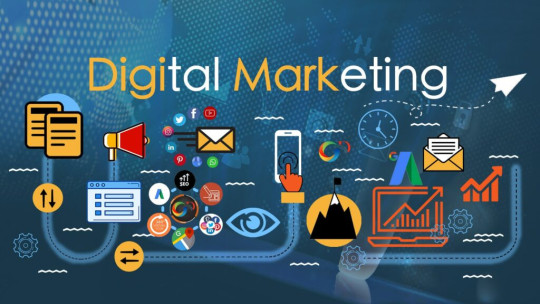Don't wanna be here? Send us removal request.
Text
Digital Marketing: The Ultimate Guide to Online Success
Introduction
In today's digital age, marketing has evolved beyond traditional advertising methods to encompass a vast online landscape. Digital marketing has become an essential strategy for businesses aiming to reach a broader audience, increase brand awareness, and drive revenue. This article explores the fundamentals, types, benefits, and strategies of digital marketing, providing insights into how businesses can leverage it for success.
What is Digital Marketing?
Digital marketing refers to the use of online platforms, digital technologies, and internet-based strategies to promote products, services, and brands. It includes various channels such as social media, search engines, email marketing, and content marketing to connect with consumers.
Unlike traditional marketing, digital marketing allows businesses to target specific audiences, measure results accurately, and optimize campaigns in real time.
Importance of Digital Marketing
Digital marketing is crucial for businesses due to its numerous advantages, including:
Global Reach – Businesses can reach audiences beyond geographical boundaries.
Cost-Effectiveness – Digital campaigns are more affordable than traditional advertising methods.
Measurable Results – Marketers can track performance using analytics and adjust strategies accordingly.
Targeted Advertising – Businesses can segment audiences based on demographics, interests, and behavior.
Higher Engagement – Interactive content, social media, and personalized emails help improve customer engagement.
Types of Digital Marketing
Digital marketing is a broad field comprising various strategies and channels. Here are the most effective types:

Search Engine Optimization (SEO)
SEO is the process of optimizing a website to rank higher on search engine results pages (SERPs). It involves:
On-Page SEO: Optimizing content, keywords, meta tags, and images.
Off-Page SEO: Building backlinks and social signals.
Technical SEO: Improving site speed, mobile-friendliness, and secure connections.
Content Marketing
Content marketing focuses on creating and distributing valuable, relevant content to attract and retain an audience. It includes:
Blog posts
Infographics
Videos
E-books
Whitepapers
Social Media Marketing (SMM)
Social media platforms like Facebook, Instagram, Twitter, and LinkedIn are used to connect with audiences, build brand awareness, and drive traffic. Strategies include:
Organic posts
Paid advertisements
Influencer marketing
Community engagement
Pay-Per-Click Advertising (PPC)
PPC is an online advertising model where advertisers pay a fee each time their ad is clicked. Platforms include:
Google Ads
Facebook Ads
LinkedIn Ads
Email Marketing
Email marketing involves sending personalized messages to a list of subscribers. It helps in:
Lead nurturing
Customer retention
Product promotions
Automated follow-ups
Affiliate Marketing
Affiliate marketing allows businesses to partner with affiliates who promote their products in exchange for a commission. It is performance-based and includes:
Influencer collaborations
Blog referrals
Coupon code promotions
Influencer Marketing
Brands collaborate with influencers who have a large following on social media to promote their products or services. This method enhances credibility and trust among target audiences.
Video Marketing
Video marketing leverages video content to engage audiences. Popular platforms include:
YouTube
TikTok
Instagram Reels
Mobile Marketing
With the increase in smartphone usage, mobile marketing strategies focus on:
SMS marketing
Mobile apps
Push notifications
Digital Marketing Strategies for Success
To maximize the benefits of digital marketing, businesses must implement effective strategies. Here are some key approaches:
Define Your Goals
Businesses should set clear and measurable goals, such as increasing website traffic, generating leads, or improving sales.
Understand Your Target Audience
Analyzing demographics, interests, and online behavior helps create personalized marketing campaigns.
Create High-Quality Content
Content should be informative, engaging, and valuable to attract and retain customers.
Optimize for SEO
A well-optimized website improves visibility on search engines, leading to higher organic traffic.
Leverage Social Media
Regular engagement on social media platforms helps build brand awareness and customer loyalty.
Use Paid Advertising Wisely
Investing in PPC and social media ads can drive targeted traffic and conversions.
Measure and Analyze Results
Using tools like Google Analytics, marketers can track performance and adjust strategies accordingly.
Challenges in Digital Marketing
Despite its benefits, digital marketing has challenges:
Increased Competition – Many businesses compete for the same audience.
Changing Algorithms – Search engines and social media platforms frequently update algorithms.
Data Privacy Regulations – Compliance with data protection laws like GDPR is essential.
Ad Fatigue – Overexposure to ads can lead to lower engagement rates.
Future Trends in Digital Marketing
Digital marketing continues to evolve with emerging technologies. Future trends include:
Artificial Intelligence (AI) – AI-powered chatbots, predictive analytics, and personalized recommendations.
Voice Search Optimization – Increasing use of voice assistants like Alexa and Google Assistant.
Augmented Reality (AR) and Virtual Reality (VR) – Interactive and immersive shopping experiences.
Blockchain Technology – Enhanced transparency and security in digital advertising.
Conclusion
Digital marketing is an essential tool for businesses in the modern world. By leveraging various strategies, optimizing content, and staying updated with industry trends, businesses can enhance their online presence and achieve their marketing goals. With continuous advancements in technology, digital marketing will remain a dynamic and indispensable part of business growth.
Embracing digital marketing not only helps in reaching potential customers but also strengthens brand reputation, engagement, and profitability. By implementing the right strategies and adapting to changes, businesses can ensure long-term success in the digital landscape.
1 note
·
View note